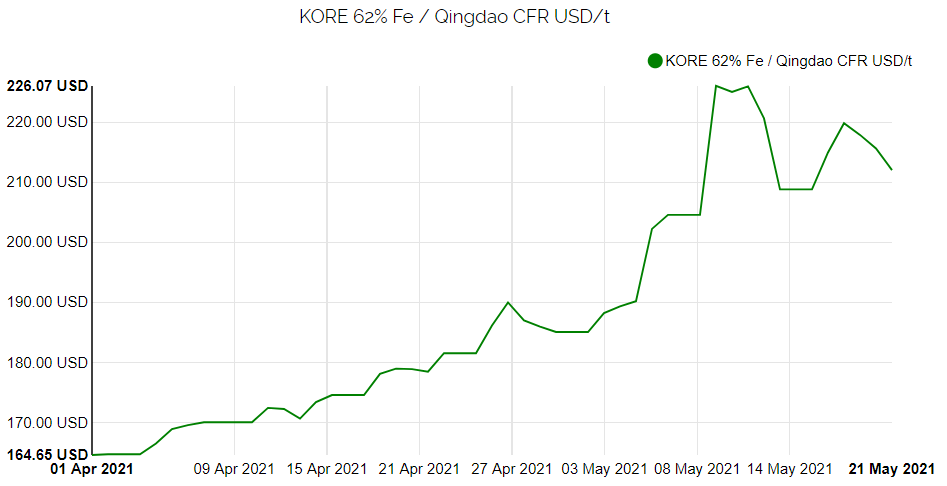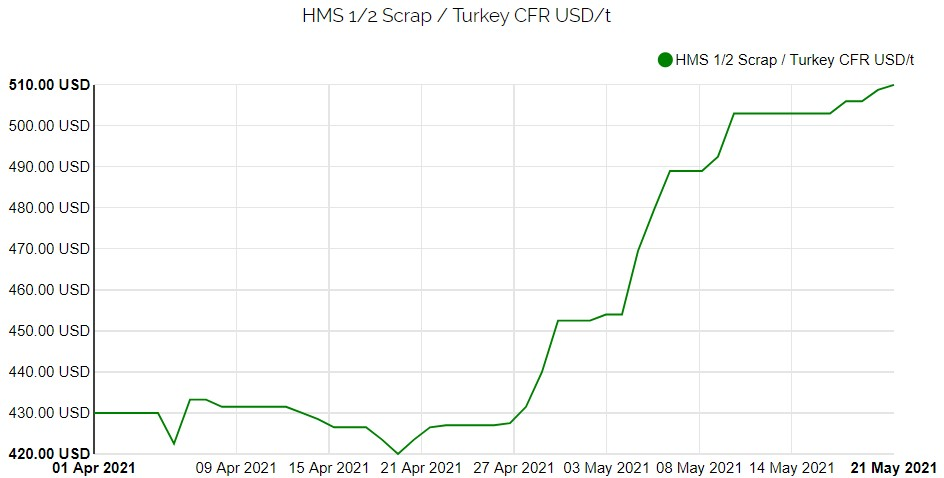Dear All Steels Customers,
This is a relatively short note intended to provide you
with an update on the key outcomes relating to predictions we made in our 23
April 2021 UK Steel Market Evaluation Report.
Steelmaking Raw Materials
Virtually all raw materials continued on an upward
trajectory, as anticipated, with record-breaking price levels being
reached. In our previous note, we reported iron ore levels breaking the
US$180 per tonne barrier (KORE 62% Fe/Qingdao CFR) and for the last fortnight,
the rate has capitulated at a new record-breaking high in the band of US$208.84
to $226.07 per tonne. As you would expect scrap prices also followed this
move growing from US$427 per tonne to US$510 per tonne (HMS1/2 Scrap/Turkey
CFR).
The two graphs below showing this move requires little
explanation to understand the impact on steelmaking.
1: Iron Ore

2:
Scrap

Whilst the push on iron ore prices appears to have taken
some breathing space over the last fortnight the dynamics remain unchanged with
demand continuing to increase. Hence, the possibility of another price
run over the summer must now be a serious consideration. Similarly on
scrap the market is currently adjusting to the reality of the newfound high
prices but speaking to one of our main Turkish suppliers over the weekend they
remain deeply concerned that the price of scrap is likely to push on
again. The new concern on the horizon for Turkish steel makers is that
there is speculation that the EU will enforce scrap export taxes and there are
already reports of the Ukraine increasing its scrap export tax to 90 Euro per
tonne.
General Steel Price Movement in the UK
In our note of 23 April 2021, we strongly expressed the
likelihood of further price increases and this has happened at quite staggering
levels as summarised below:
Structural Sections
5 May 2021 – British Steel announced a £50p/t increase.
14 May 2021 – British Steel announced a plan / necessity for customer allocations to apply.
18 May 2021 – British Steel announced a further £100p/t increase.
18 May 2021 – British Steel announced a customer allocation system based on historical purchase levels.
4 May 2021 – ArcelorMittal announced a £40p/t increase.
17 May 2021 – ArcelorMittal announced a further £80p/t increase.
18 May 2021 – ArcelorMittal issued a rolling programme with restricted availability and notification of tonnage allocations to be applied.
At the time of writing this report virtually all other EU
producers have extended a period of not offering to the UK market due to
overwhelming demand in mainland Europe and the fact that scrap prices have not
settled down so there is a reluctance to offer forward.
As a reminder since the prices started to climb on the
current cycle from August 2020 British Steel has now actually applied a total
of £410 per tonne of price increases.
Merchant Bar
19 May 2021 – Liberty Merchant Bar announced a further £80p/t increase to follow up on a £40p/t mid-April price increase.
26 April 2021 – LME (Beltrame) announced a £20p/t increase.
14 May 2021 – LME (Beltrame) announced a further £80p/t increase.
Other suppliers of merchant bar do not make public price
increase announcements, but they have all applied similar price measures and
most have restricted availability.
As a reminder since the prices started to climb on the
current cycle from August 2020 Liberty Merchant Bar has now actually applied a
total of £310 per tonne of price increases.
Hollow Sections
Like merchant bar we do not see official price increase
announcements from domestic producers although at this present time we
understand that Liberty Tubes has temporarily ceased manufacture due to the
availability and price of hot rolled coil.
What we can advise however is that our buy price from
Turkey since 23 April 2021 has increased by a magnitude of U$250 per tonne
(£178 per tonne). In addition to this price increase, there is then also
a Safeguard duty factor which is unavoidable even when customs clearing on the
first day of each quarterly quota window and this is becoming more sizable as
the cost of hollow sections keeps rising.
As a reminder since the prices started to climb on the
current cycle from August 2020 Turkish Hollow Section Prices have increased by
US$670 per tonne from our own experience (£478 per tonne). However, you
then need to add increased shipping costs and a Safeguard duty impact, which
became a reality when UK Safeguard Quotas came into force on 1 January
2021. Both of these impacts are significant.
Supply & Demand
In our report of 23 April 2021, we made the point that we
were entering a new paradigm of market pressures where demand exceeds supply,
and it is fair to say that we are already now starting to see the consequences
of this situation. Over the past several days we have already witnessed
availability being more critical than price and given that we are now knocking
on the door of the mill summer shutdowns this problem is going to become even
more acute.
Speaking out as a trader a new phenomenon for All Steels
and probably many other businesses in the supply chain is affordability.
As a business typically holding 40,000-45,000t of stock with similar quantities
in the pipeline financed by letters of credit our substantially increased
banking facilities will simply not allow for such volumes to be
maintained. Hence, the only way to combat this is to reduce inventory
levels to an affordable level. It, therefore, seems inevitable that
whilst availability from the mills cannot keep pace with demand dock stocks and
probably stocks amongst the UK stockholding community will also tighten up even
further.
As the saying goes it, therefore, looks like we
are heading into a perfect storm that will inevitably lead to more
rationalisation/consolidation in our supply chain. Hence, it is now
totally unpredictable as to how long it will take for supply and demand to get
in balance and how far prices will rise in the intervening period. The
consensus is that unaffordability will eventually bring prices crashing back
down but at the same time, you can appreciate the logic that steel producers
can now see the benefit of keeping capacity tight, and with such huge costs of
bringing lost capacity back to life will any steelmaker wish to make such a
move? It is fair to say that many pundits had speculated that the rising
cost of copper would not be sustainable on the grounds of affordability but on
the London Metal Exchange the price of copper has increased from US$ 2,908 per
tonne in December 2008 to its current level of US$ 10,011 per tonne and demand
remains insatiable. Food for thought!